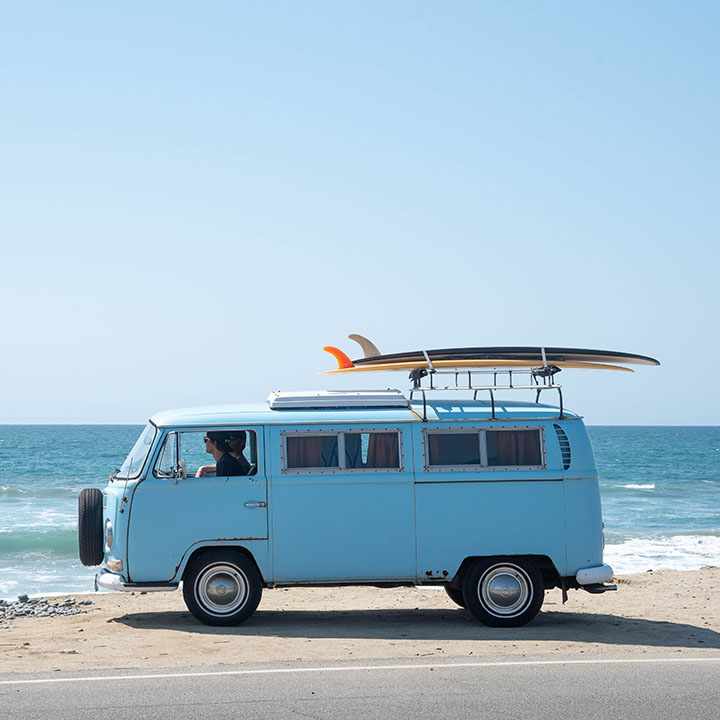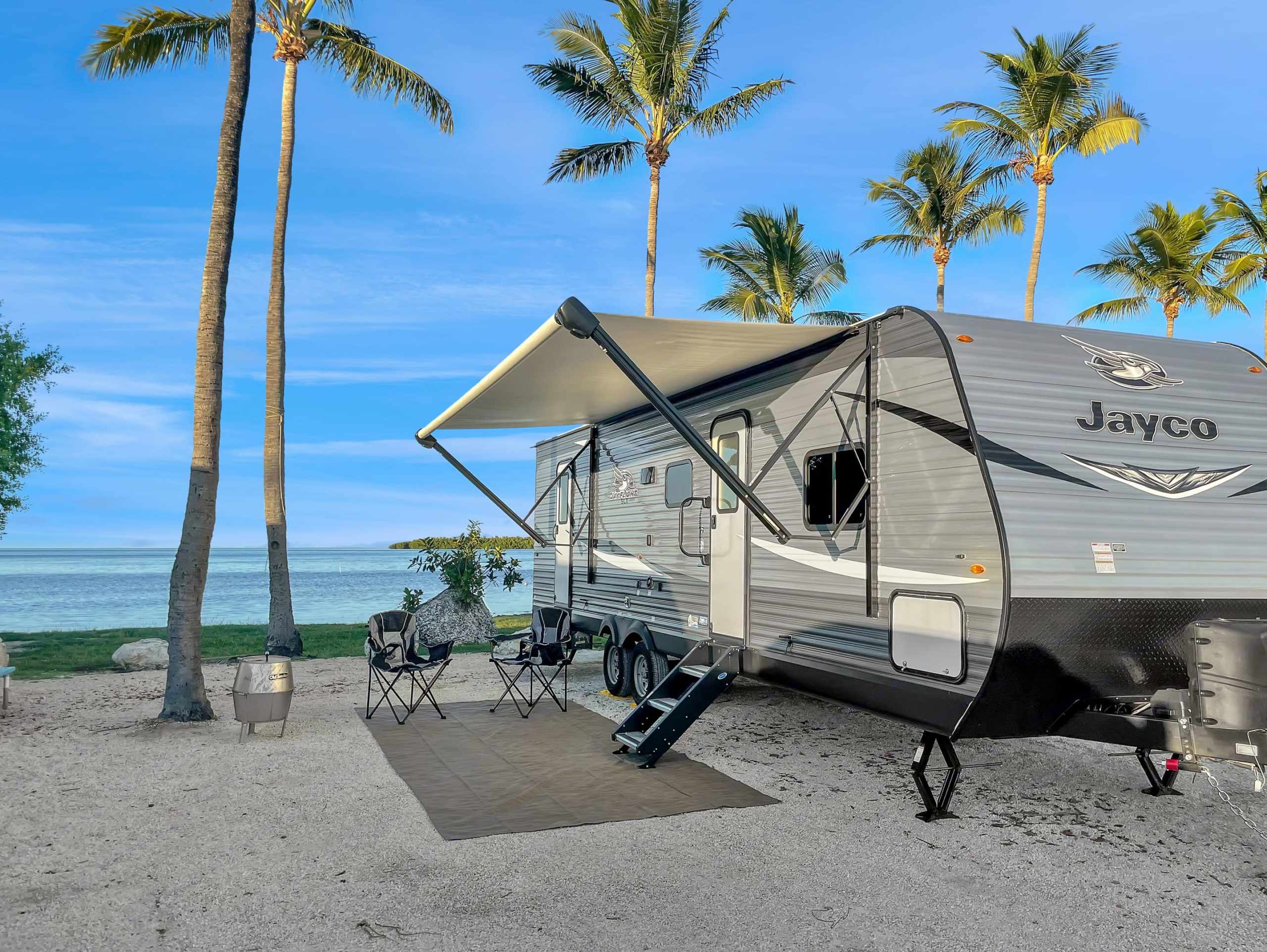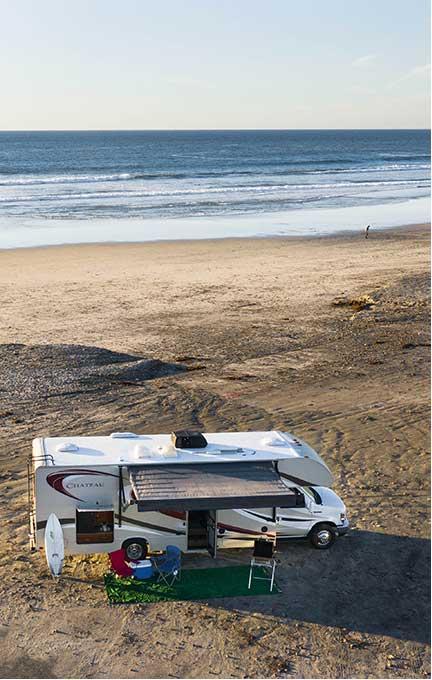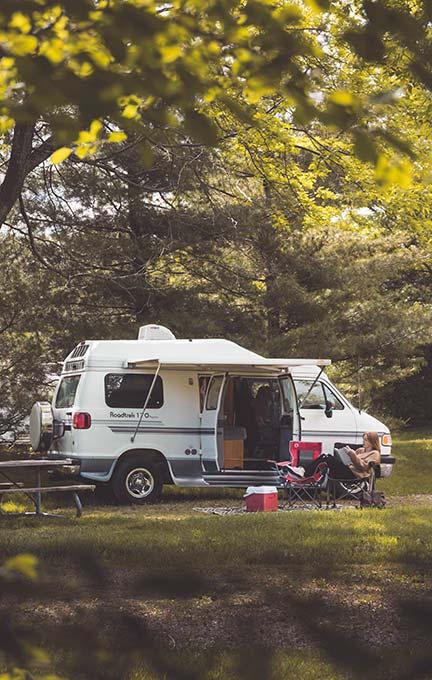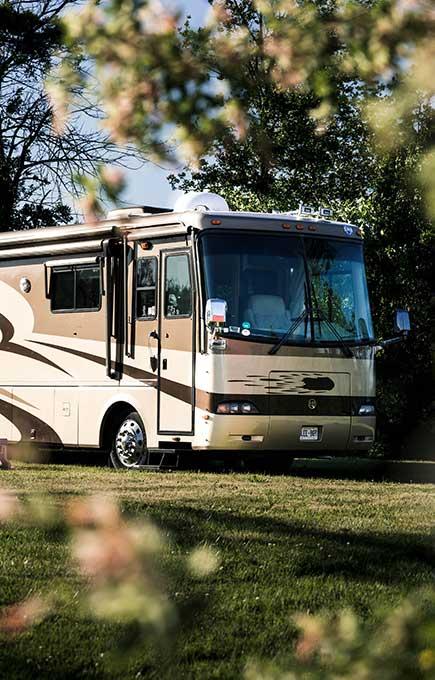Thinking of buying a fifth wheel? At Outdoorsy, we know it’s such a great option. However, if you know anything about fifth-wheel trailers, you know that there are a ton of different RV manufacturers and models to choose from. Having an abundance of choices can make the process of choosing a new rig a bit overwhelming. If you’re still on the fence, read these 10 reasons why you should choose a fifth wheel.
If you are ready to buy, keep the following things in mind, and you’ll be sure to make the perfect fifth-wheel RV purchase for you!
And if you’re still in exploration mode – check out these RVs we have for rent so you can try before you buy.
Before purchasing, try a fifth-wheel RV for rent near you
Why are you buying a fifth wheel?
Are you planning to live in the fifth wheel full-time or use it for occasional camping trips a few times a year? This question is important for several reasons. Living in a unit will require you to put more thought into how comfortable you will be in the fifth wheel on a day-to-day basis. You’ll also want to pay more attention to its durability and the materials that were used in the making of it. You’ll want an all-season unit that makes you feel most at home. Certain RV brands are known for manufacturing 5th wheels that are designed for full-time use, so you’ll want to research those brands. Be aware that these units tend to be heavier, requiring a more heavy-duty truck, but they are designed to be much more durable.

On the flip side, you won’t be as limited if you want to buy a fifth-wheel camper for occasional camping trips. Let’s face it; anything will be better than a tent! The new trend of lightweight fifth-wheel campers has become popular because they are ½-ton towable, which is a great feature for the occasional trip. If you plan to be the occasional weekend warrior in your fifth wheel, consider renting it out instead of storing it. You can earn a lot of money and avoid lots of storage costs!
How will you use your fifth wheel?
How you plan to use your fifth-wheel trailer is also a very important thing to consider before even beginning the hunt. Whether you plan to live stationary in your fifth wheel or haul it all over the country, moving destinations every couple weeks, you’ll need to carefully consider every aspect and feature of the fifth wheel you purchase. As a consumer, being well-informed is the key to making the right purchase, so make sure to do plenty of research and read reviews.

Which fifth-wheel length is right for you?
When the time comes to go shopping for a fifth-wheel trailer, it’s easy to get carried away. The longer the unit, the more features it will have, and the more likely you are to fall in love with it. Larger fifth-wheel campers can feature everything from kitchen islands to living spaces with fireplaces, washing machines, and bedrooms with king-sized beds and a full-sized closet. But each of these features comes with extra length. While it’s easy to say, “What’s a few more feet?” to justify adding those luxuries, it’s important to understand the impacts that length can have on your travel plans.

First of all, the longer the RV, the more difficult the towing becomes. That’s self-explanatory, but did you know that many parks and campgrounds have length restrictions? While it can vary, campgrounds inside national parks are notoriously unfit for big rigs. Unless you’re planning to be completely stationary or stay at RV resorts that can accommodate long RVs, don’t go too overboard with the length of your fifth wheel. Otherwise, it can be a challenge to find spots to park it. Once you’ve determined what length you’re comfortable with, this will significantly help you narrow down the fifth-wheel trailers you choose to look at when you go shopping.
What fifth-wheel weight is right for you?
You may already own a truck or are planning to purchase one to tow your fifth wheel. Either way, it’s extremely important to understand your fifth-wheel weight and how much your vehicle can safely tow. Unfortunately, making this determination is not as straightforward as you might think. There are a lot of different weights (and acronyms) to understand and check to ensure safe towing. This site is a great resource to get started on learning all of the different weights.
Here is an example of validations to ensure that a truck could safely tow a fifth-wheel trailer. In order to be safe, all of the following weight tests need to be true:
- Truck’s Maximum Trailer Rating (from Manufacturer) > Trailer’s GVWR (from Manufacturer)
- Truck’s Maximum Payload (GVWR – curb weight) > Trailer Tongue Weight (fifth wheel = 15-25% of GVWR) + Truck Cargo (passengers, luggage, etc.)
- Truck’s Reserve Axle Capacity – Rear (gross axle rear rating – curb weight rear axle) > Trailer Tongue Weight (fifth wheel = 15-25% of GVWR) + Truck Cargo (passengers, luggage, etc.)

Along with your truck’s towing capacity, there is another weight you’ll need to take into consideration. Fifth wheels have a Gross Vehicle Weight Rating (GVWR), but you’ll also need to determine the trailer’s Cargo Carrying Capacity (CCC ). Here is the formula for determining a fifth wheel’s CCC:
CCC = GVWR – unloaded vehicle weight – full fresh tank water weight – full LP gas weight.
Knowing your trailer’s CCC will allow you to determine how much weight you can add with all the belongings you plan to store in the RV. You will find a sticker somewhere in the fifth wheel that has all these numbers for you.
Here’s an example:
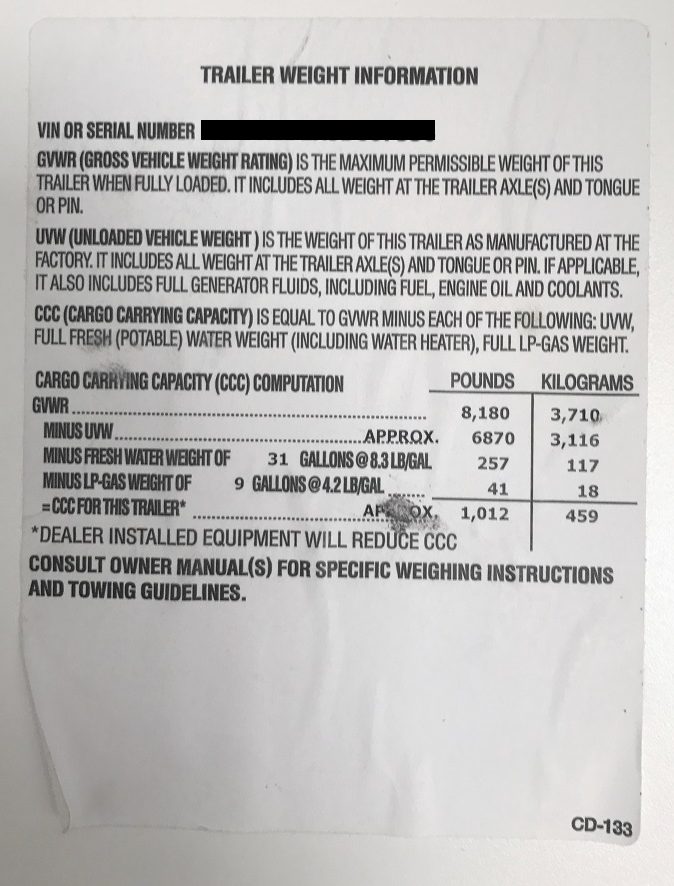
When you do the math, you only have 1,012 pounds of additional cargo that you can carry inside. It’s surprising how quickly items can add up, so be sure to give yourself plenty of wiggle room. Not taking weight into consideration is a common mistake people make when purchasing a fifth wheel. You won’t want to worry about weight every time you add a new item to your RV.
Try before you buy. Fifth-wheel RVs for rent near you
What about holding tanks?
RVs have tanks that hold freshwater, greywater (water drained from the shower, kitchen, and bathroom sinks), and blackwater (water that comes from the toilet). The capacity of these tanks is especially important if you plan to dry camp or boondock in your RV. To give you an example, a fifth wheel has a 30-gallon freshwater tank. When you want to find free places to park and are willing to sacrifice hookups, you can only last about three days with this amount of water. Having a smaller holding tank means that you will have to drain your tanks more frequently and fill up your freshwater tank every few days. So keep in mind the size of the holding tank when you are purchasing your fifth wheel.


What else?
Choosing the fifth wheel that is right for you really comes down to your personal preferences, lifestyle, and needs. Length, weight, and holding tanks are three features to pay attention to. Determining your needs regarding those features will help you narrow down the options you’ll have when you begin RV shopping. The best way to do that is to test out an RV rental before you buy.
We hope this article equips you with the knowledge to bring to the dealership and helps you feel confident in the purchasing process.
